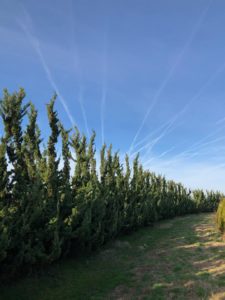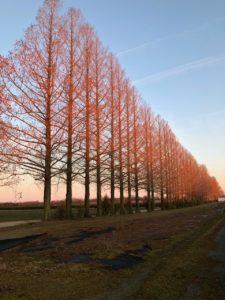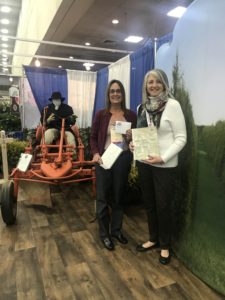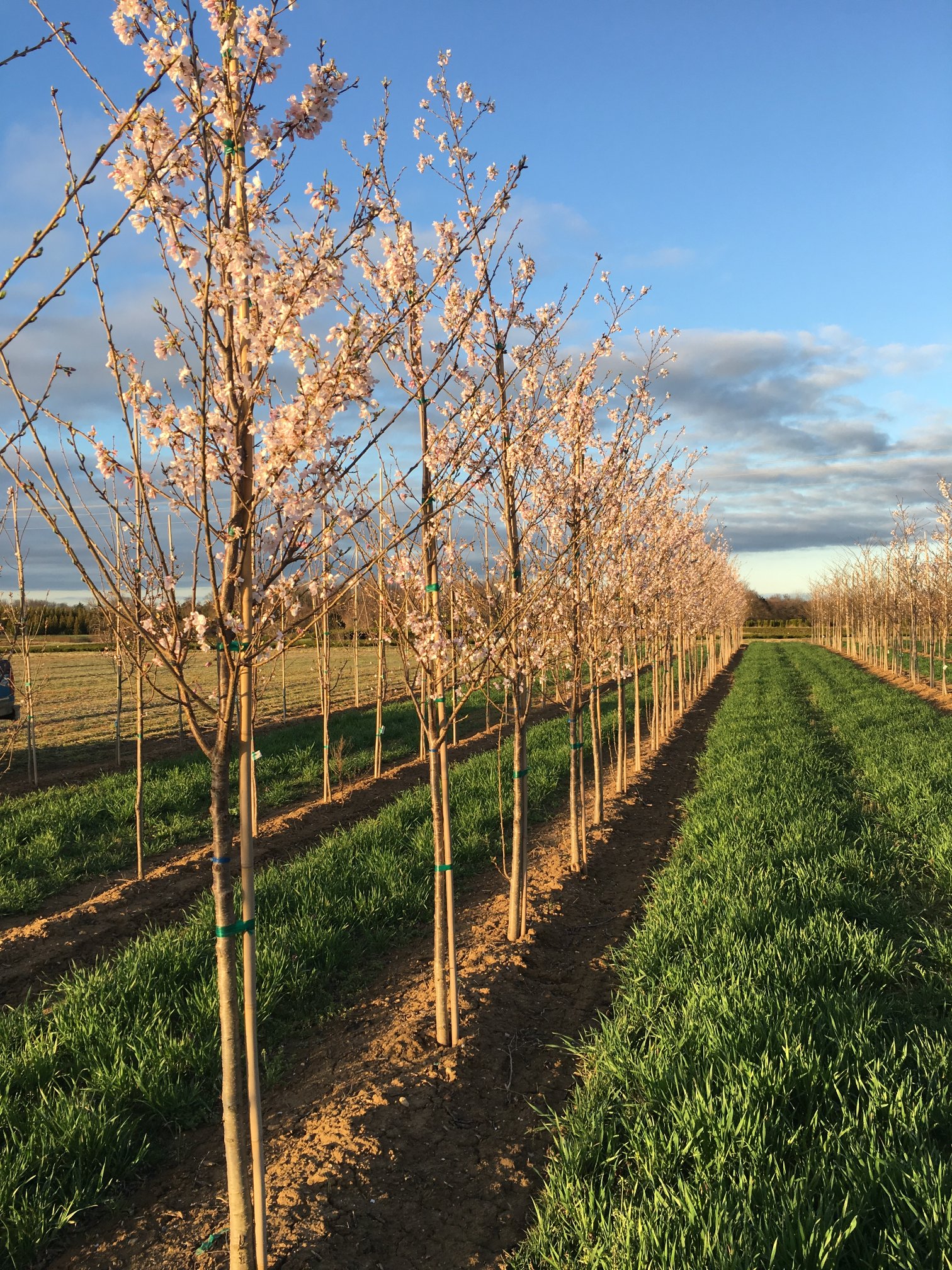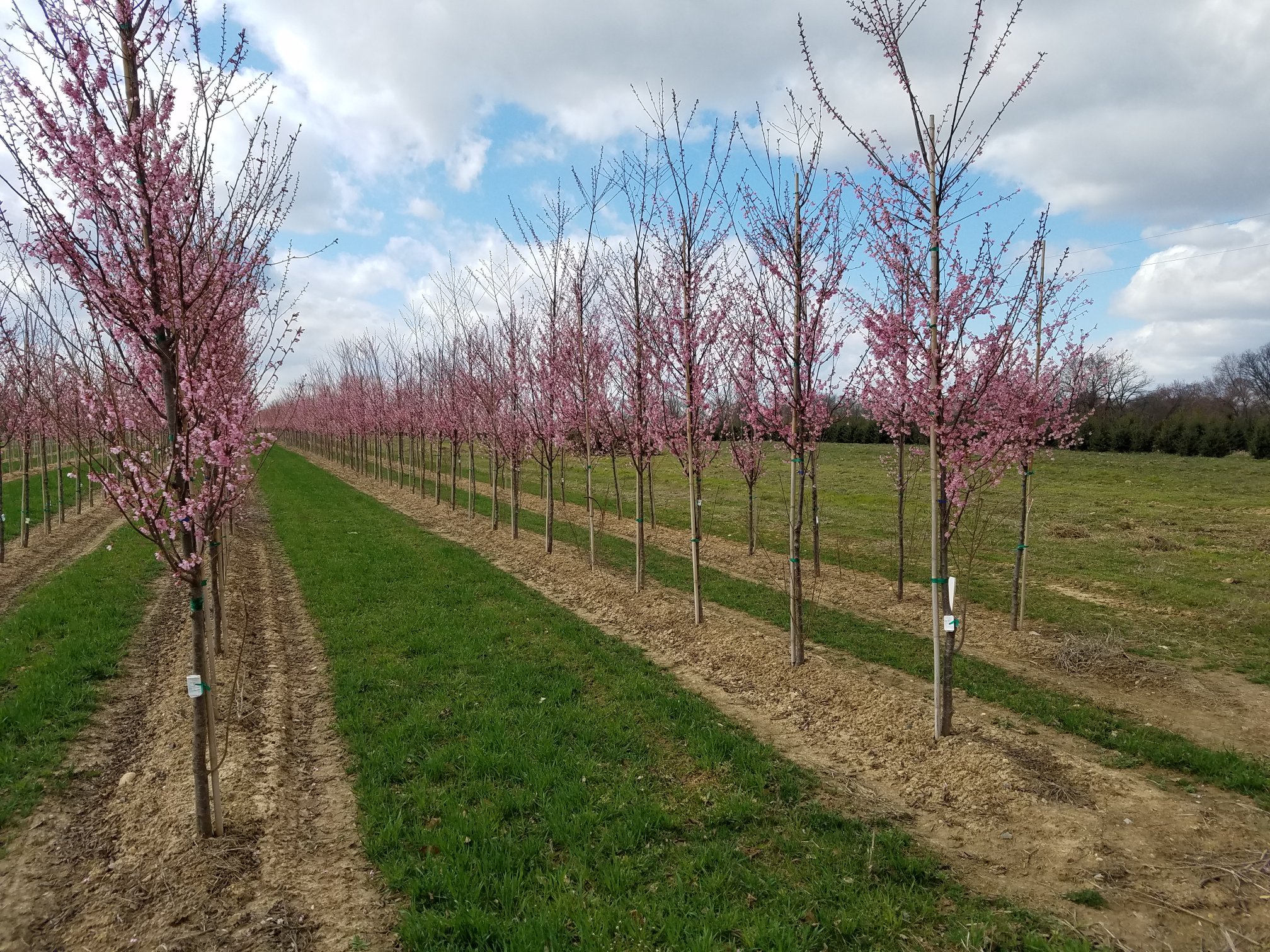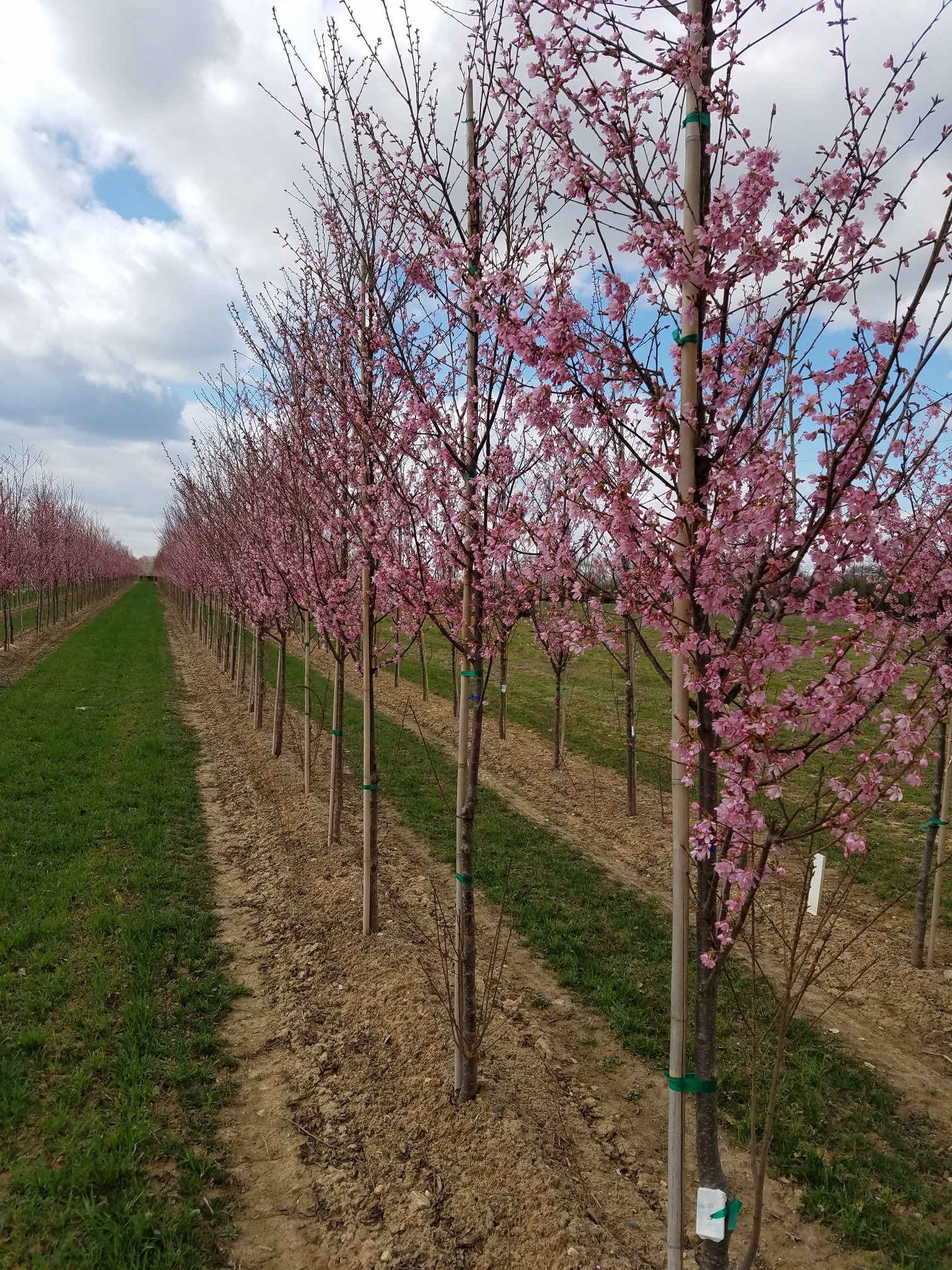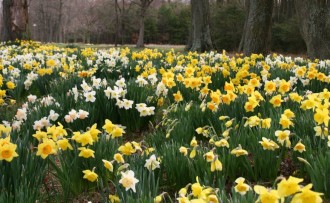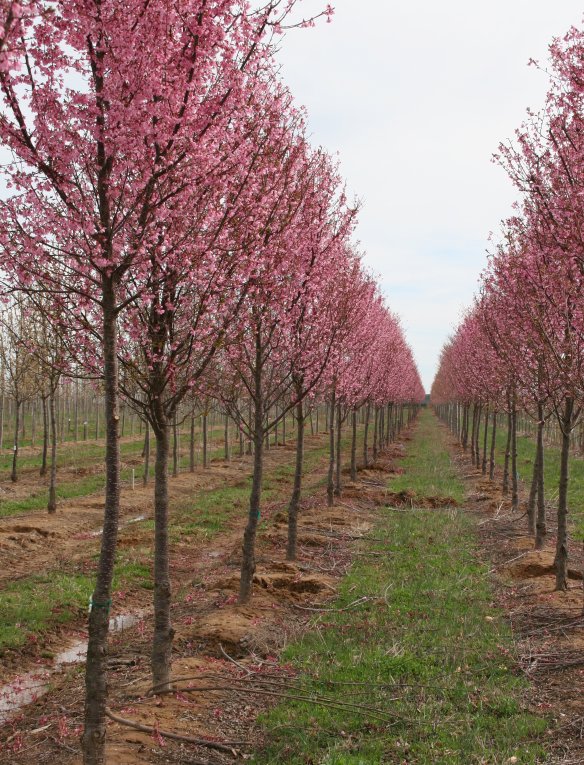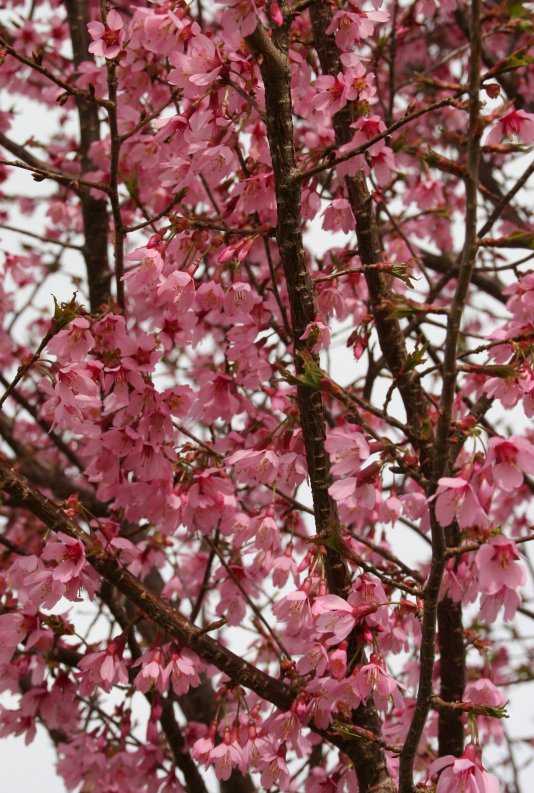Category: News
Spring Update with Kim Usilton
Kim Usilton, our Customer Service Supervisor, hits the field to give the Spring Update. Find out what’s past its prime, what’s being dug now and what you should be putting on your order.
A Day in the Life of a Bareroot Tree
In this video you’ll see how we remove our shade tree liners from the ground. The bareroot trees will be moved to another location where they will be re-planted in their final spacing. This is the second and final move in the production process.
Our Field Crew is Back & Ready to Get Digging!
You know Spring is right around the corner when the bus arrives at the farm with our field crew. The team is rested up and ready to get to work digging the plant material that Angelica Nurseries is known for. The success of our plant material is not only because of the great start and care we give them while they grow, but also because of the skilled team we employ to prepare and dig them for shipment.
While the men are getting settled, take a look at our Current Availability and be sure to have your orders or revisions submitted to Customer Service.
Spring 2021 – Angelica’s Field Crew Returns! (Videos)
Summer Digging? Why, yes we are!
Sure it’s hot outside, but you can still plant during summer. So
long as key plant needs are met, adequate water, proper sun exposure
and well-drained soil, it can be done.
Angelica Nurseries digs plant material throughout the summer
successfully. Summer digging is a complex process that requires extra
time and labor to ensure viability.
- Plant material is watered a full day prior to harvesting
- Ball sizes are increased to further maximize water retention
- After removal from the field, plants are transported through an
overhead watering boom and placed in a ‘hardening off’ area to
acclimate prior to shipping.
Usually, plant failure is not because it was planted during the
summer, but because it’s basic needs were not met. Give Angelica a
call for premium plant material, hardened off for peak performance on
your Jobsite.
Juniper ‘Robusta Green’
Sun rising at Angelica Nurseries
WINNER of “Guess Who I Am?” at MANTS
Should You Buy Angelica Nursery Stock?
Attention All Conifer Lovers!
Protecting Pollinators
 Michigan State and North Carolina State Universities are hosting the Protecting Pollinators in Urban Landscapes Conference in Traverse City, MI on October 9th through 11th, 2017. More information can be found at protectingpollinators.org
Michigan State and North Carolina State Universities are hosting the Protecting Pollinators in Urban Landscapes Conference in Traverse City, MI on October 9th through 11th, 2017. More information can be found at protectingpollinators.org
Prunus yedoensis / Yoshino Cherry
Prunus ‘Okame’ / Okame Cherry
Eastern White Pine
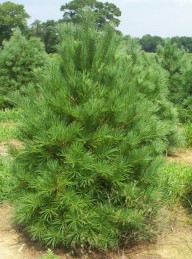 Did you know that Pinus strobus (Eastern White Pine) played a notable role in America’s history? In colonial days, the best trees were reserved by the King and the Royal Navy for masts on British ships. Lumber from Eastern White Pine is very light, yet strong. The versatile lumber was easy to cut, shape and finish. Great Britain decided they needed this versatile lumber to build the strongest and fastest ships. The King assumed ownership of the best Eastern White Pines within 10 miles of any navigable waterway. All specimen trees were branded with “The King’s Broad Arrow”.
Did you know that Pinus strobus (Eastern White Pine) played a notable role in America’s history? In colonial days, the best trees were reserved by the King and the Royal Navy for masts on British ships. Lumber from Eastern White Pine is very light, yet strong. The versatile lumber was easy to cut, shape and finish. Great Britain decided they needed this versatile lumber to build the strongest and fastest ships. The King assumed ownership of the best Eastern White Pines within 10 miles of any navigable waterway. All specimen trees were branded with “The King’s Broad Arrow”.
Houses were built and tools were made with the majestic Eastern White Pine. The inner bark was dried and ground into flour. Tea was made from the needles. The bark was applied to wounds and distilled into cough remedies. The white pine was the colonist livelihood. Here these grand trees sat on their property and they couldn’t touch them because the King said so. They paid no attention to the “Broad Arrow” protected trees and harvested them anyway putting the wood to use. Rebellion from local settlers clashed with British authorities in such scuffles as “The White Pine War’ and “The Pine Tree Riot”. These were the first acts of rebellion against British rule. The Eastern White Pine was the emblem on the first colonial flag. The Revolutionary War was about many things and the Eastern White Pine weighed heavy on the colonist desire for independence.
Soft, flexible blue-green needles and pyramidal form make Pinus strobus an exceptional ornamental. Favored for its beauty and fast growth rate, Pinus strobus is a valuable tree. It is hardy for zones 3 through 8 and responds well to shearing. This low maintenance plant is widely used as a screen, in park and estate plantings and wind breaks.
Plant some history!
Evergreen Shrubs
Water, Water, Water
Probably the most single important factor caring for newly planted trees and shrubs. Newly planted plants have not extended their roots into the soil, adequate moisture must reach the root ball for survivability.
Typically, new plantings require 1 inch of rain per week or that equivalent. Soil type will determine watering needs. If your soil is sandy, new plantings may require more than an inch of rain per week.
Looking for Privacy?
If you are looking for privacy, we’ve got the evergreens for you. Large White Pine or Norway Spruce are a perfect living fence offering the privacy you are looking for. These towering evergreens can also stop noise when planted close together. We anticipate harvesting White Pine and Norway Spruce July 1st. Please call customer service for any of your plant material needs.
Congratulations to Longwood Gardens!
 Longwood Gardens was named Best Botanical Garden by USA Toda and 10Best! Read about it here!
Longwood Gardens was named Best Botanical Garden by USA Toda and 10Best! Read about it here!
Winter Consideration
In the event of heavy snows, gently remove snow from branches. Accumulation of ice on branches should be allowed to melt. Avoid any heavy pruning. Reliable snow cover during the winter helps to insulate from the cold.
Make sure any above ground plants are out of direct heavy winds. Mulch heavily and burlap to help insulate.
Container Production Notice
 During our history our focus has been to provide quality specimen ball and burlapped plants to our customers. Our involvement in container production has been largely due to participation with Endless Summer®, Flower Carpet®, KnockOut® and Drift®. In today’s economy and given our limited container menu, we find it tough to compete with other large container growers.
During our history our focus has been to provide quality specimen ball and burlapped plants to our customers. Our involvement in container production has been largely due to participation with Endless Summer®, Flower Carpet®, KnockOut® and Drift®. In today’s economy and given our limited container menu, we find it tough to compete with other large container growers.
While it has been a difficult decision, we have decided to discontinue our production of finished containers. We will sell through our current inventory and anticipate that inventory will be exhausted by Fall 2015.
Customers will still notice containers in production during their visits. This is part of our liner production as many of our conifers, broad leaf evergreens and deciduous shrubs are grown in containers for one to two years prior to field planting. After careful consideration, we will continue to offer a specimen box line in limited quantities. If you have suggestions for varieties you would like to see in this line, please contact us. We hope to offer this line by Spring 2017.
We regret any inconvenience this announcement may cause. Please do not hesitate to contact Customer Service with any questions. We appreciate and value our business relationship and look forward to your continued interest in our ball and burlap line of plants.
Customer Service
Spring ✔ List
Welcome Spring (finally)!
Featured Plant: Betula nigra ‘Cully’ (Heritage® River Birch)
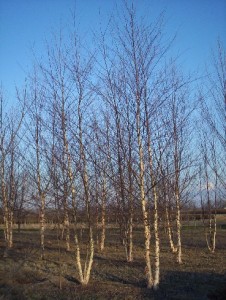 Betula nigra ‘Cully’ (Heritage® River Birch)
Betula nigra ‘Cully’ (Heritage® River Birch)
Looking for some winter appeal in your landscape? Found growing in St. Louis by Mr. Earl Cully, Heritage® River Birch may be just what your garden needs. With it’s creamy tan to salmon exfoliating bark, this vigorous grower shows no major concern for pest or disease. Excellent as a specimen or in small groups, Heritage® River Birch is also well suited for planting along stream banks.
Plenty of specimen trees to choose from, please contact Customer Service for availability.
New Plant Pick!!
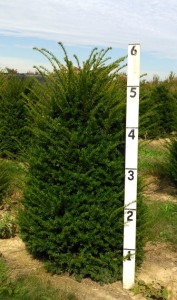 Taxus cuspidata ‘Capitata’ (Pyramidal Japanese Yew)
Taxus cuspidata ‘Capitata’ (Pyramidal Japanese Yew)
Most common of the cultivars in the trade. With age, it can grow quite tall. Capitata yew favors fertile, well drained soil. In very cold winters, foliage will turn a bronze color. Very dense foliage and pyramidal in form (broader at the base and tapering to the top). This is a perfect plant for formal entryways.
With plenty of sizes to choose from, please contact Customer Service for availability.
Customized Digging
- Uniform Grading – every plant is saleable
- Careful Selection – each plant is carefully tagged to your specification
- No Storage – every order is freshly dug, no heeling in or drying out
- Uniform Ball – each ball carefully dug and burlapped
- Palletized Loading – reduces handling from field to trailer
- Reliable Trucking – modern trucks and maximum pay loads keep costs down
For screening, we recommend….
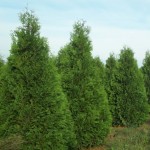 Thuja occidentalis ‘Nigra’ (Dark Green American Arborvitae)
Thuja occidentalis ‘Nigra’ (Dark Green American Arborvitae)
Available in sizes 6’ and larger.
Contact customer service department for pricing at (800) 867-7673 or customerservice@angelicanurseries.com
“Rush” Processing Update
Our typical turn-around time to process and deliver an order is 7 – 10 days. The request to hurry orders beyond our normal process is increasingly prevalent. We are striving to accommodate such requests and are pleased to offer our customers “Rush” request service.
There is added expense to re-organize labor and equipment associated with such requests. “Rush” processing is subject to an additional 3% per plant. “Rush” processing is loading an order in 4 days or less for ball and burlap and 2 days or less for containerized plants. Noon is the cut off time on any given day.
We are not able to accommodate “Rush” requests if digging conditions warrant a summer dig charge. We reserve the right to decline a “Rush” request if it is not in the best interest of the plant or our customer.
Please do not hesitate to contact customer service with any questions.
Obituary for Mr. Bernard Eugene Kohl, Sr.
 Bernard E. Kohl, Sr. of Kennedyville, Maryland died on February 6, 2014 at Seasons Hospice at Christiana Hospital in Delaware. He was 82.
Bernard E. Kohl, Sr. of Kennedyville, Maryland died on February 6, 2014 at Seasons Hospice at Christiana Hospital in Delaware. He was 82.
He was born on April 4, 1931 in Reading, PA the son of the late Thomas J. and Elsie May Marks Kohl. He was a graduate of Shillington High School class of 1949 and served in the U.S. Army. Following an honorable discharge he married Edith E. Ulrich on August 9, 1958.
Mr. Kohl lived in Angelica, PA where he and his family owned and operated Angelica Nurseries. He managed the property in Angelica, PA until 1970 when he moved to Kennedyville, MD operating Angelica Nurseries with his brothers, where he oversaw the maintenance of the equipment.
Mr. Kohl continued to participate in the operation of the business until a recent automobile accident.
He was a member of Frank M. Jarman American Legion Post #36 Chestertown.
Mr. Kohl enjoyed woodworking, skiing, traveling in his motorhome, reading, watching NASCAR, and more importantly spending time with his family.
In addition to his wife of 55 years, he is survived by a son: Bernard E. Kohl, Jr. and his wife Barbara of Kennedyville, MD, a daughter: Judith Lynn Balarezo and her husband Eduardo of Hanover, MD, a son in law: Jeff Miller of Millington, MD, four grandchildren: Rebecca Baxter, Jessica Crouch, Trey Kohl and his wife Jen, and Heather Satterfield and her husband Dan, one great grandson: Blake Kohl, along with two brothers: Verne Kohl of Galena, MD and Tim Kohl of Kennedyville, MD. One daughter the late Gayle Marie Miller predeceased him in 1989.
Services will be held on Tuesday, February 11, 2014 at 12:00 noon at Fellows, Helfenbein, and Newnam Funeral Home 130 Speer Road Chestertown where relatives and friends may call one hour prior (11-12). In lieu of flowers contributions may be made to Seasons Hospice @ Christiana Hospital 4755 Ogletown-Stanton Rd. Newark, DE 19718.
To view the online obituary, click here.
Show your plant pride!
 Watch, share and repost this short video showcasing the special relationship between people and plants. Flowers, shrubs and other ornamentals aren’t just beautiful — they naturally enhance our emotions, clean our air, even boost our economy. They deserve a green thumbs-up — because plants give back!
Watch, share and repost this short video showcasing the special relationship between people and plants. Flowers, shrubs and other ornamentals aren’t just beautiful — they naturally enhance our emotions, clean our air, even boost our economy. They deserve a green thumbs-up — because plants give back!
Introducing Our New and Improved Grading Methods
 You will notice a change to our grading method with our latest Availability List. Our product will be graded and priced according to the industry standards as established by the American Nursery & Landscape Association (ANLA). ANLA standards dictate that a plant size designation will be the minimum size allowable for that size interval and shall include plants from that size up to but not including the next larger size interval.
You will notice a change to our grading method with our latest Availability List. Our product will be graded and priced according to the industry standards as established by the American Nursery & Landscape Association (ANLA). ANLA standards dictate that a plant size designation will be the minimum size allowable for that size interval and shall include plants from that size up to but not including the next larger size interval.
We have always strived to grade our material at the high end of previous size spread. Present market conditions and repeated requests from our customers indicate the need for a better price and a plant that just meets the ANLA standards. This method of grading allows Angelica to be more competitive while, at the same time, meeting the requests from our customers. Be assured you can continue to expect the same quality which Angelica has always provided. We feel this is a change that needs to take place and one that is mutually beneficial for both our valued and potential customers.
You can read the full letter on our downloads page, or by clicking here.




